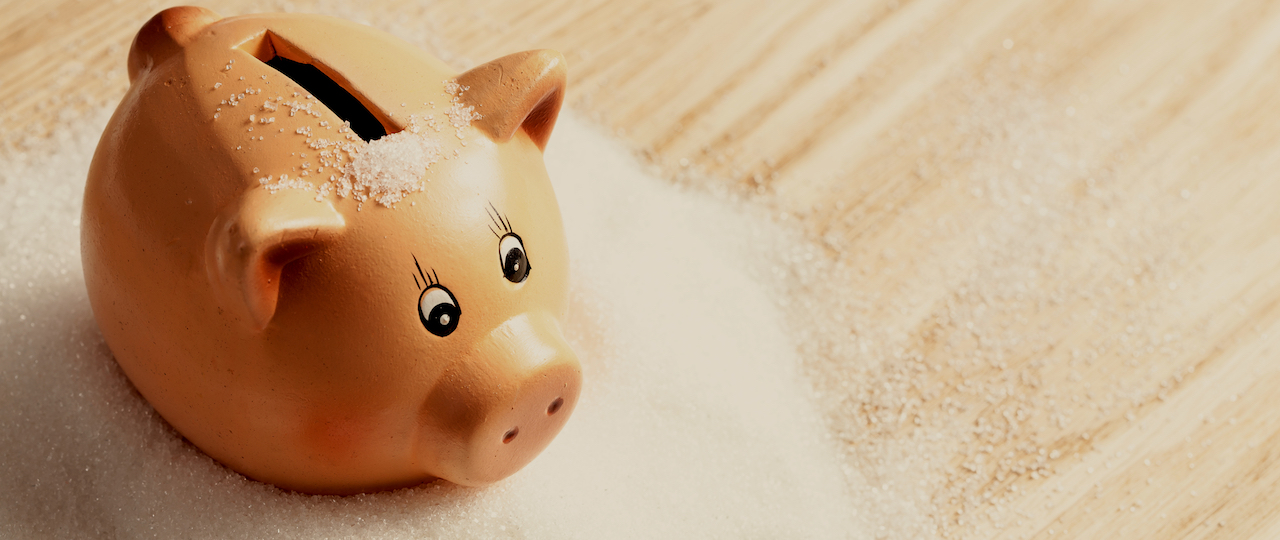Slowly but surely, sugar has become public health enemy number 1. Closely linked to several chronic diseases sugar has made our lives sweeter, but also shorter. Since processed foods hit the market, the intake of sugar has risen steadily. In fact, if you are an “average Joe”, you’re consuming somewhere between 100-200g of sugar every day without even knowing it!
Sugar as a “highly addictive white substance”
Studies have shown that sugar is as addictive as cocaine and heroin. As with any addictive substance, over time you need more sugar to get that same high. The reality is, that over and above natural sugars found in food, our bodies have no physiological need for any added sugar as it has no nutritional benefit. In other words, it provides only empty calories.
Too much of anything is never good, too much sugar damages your health
Evidence suggests that a diet high in added sugars, increases your risk of
- Weight gain and obesity, especially “visceral fat” (deep fat around organs) closely linked to several chronic health conditions
- Insulin resistance: as the body becomes resistant to the hormone insulin, risk for conditions such as metabolic syndrome and diabetes increase
- Heart disease: arteries become damaged and harden, increasing risk for high blood pressure, heart attacks and strokes
- Inflammation: sugar creates a cascade of hormonal changes that set off inflammation, both within blood vessels and around joints
- Nutritional deficiencies: sugary foods and drinks contain empty calories. These make you feel full without filling you up, making you miss out on important nutrients.
Where is all this sugar coming from?
Sugar sneaks into processed food, as it helps to preserve it for a longer shelf-life. However, it’s often what we’re DRINKING, not necessarily what we’re eating that can be the real problem.
How much of a problem? Here’s a rough estimate of how much sugar you drink. Keep in mind that 4g of sugar is 1 teaspoon:
- 250ml fruit juice: 30g sugar
- 330ml can of fizzy drink: 30g sugar
- 500ml sports drink: 35g sugar
- 250ml energy drink: 28g sugar
South Africans drink an average of 165ml of fizzy drinks daily… that’s much higher than the average for the rest of the world, which is 133ml. Considering that the consumption of sugary drinks has been linked to an estimated 184,000 adult deaths each year globally, these numbers are a great concern. What’s worse, South Africa ranks second, behind only Mexico, when it comes to the number of deaths related to the consumption of sugary drinks.
Sugar tightens your belt, in more way than one!
A diet high in sugar directly contributes to weight gain, but as government moves forward with the proposed sugar tax, you’ll soon have to be tightening up your budget belt when it comes to buying sugary drinks.
The sugar tax is to be implemented later this year once all the legal ins and outs have been finalised. Despite much protest from industry, the finance minister has confirmed that the government is forging ahead.
Much like the other “sin taxes” (placed on cigarettes and alcohol), sugary drinks (fizzy drinks and concentrated juices) are simply going to start costing you more. The proposed tax is 2.1c/gram for a sugar content in excess of 4g/100ml. Huh? Here’s a more practical example:
- A 330ml can of Coca Cola has about 30g of sugar. 12g of this sugar will be exempted from the tax. So, a can of Coke is going to cost you an extra 48c
- Concentrated drinks (e.g. Oros) will be half this amount
The underlying goal of the tax is to change health behaviour. Making “unhealthy” choices cost more will make “healthier” options the obvious choice. The plan is that some of the money generated from this new tax is going to be pumped back into the budget to support health promotion interventions as part of a strategy to fight chronic disease.
Will it work?
In theory, yes. But, theory is never practise. Looking elsewhere, however, gives us some insight: Mexico has been in the spot light recently, as one of the first countries to both introduce a sugar tax, and report on its impact. There is evidence to show that consumers DO respond to price changes. For example, in Mexico, 2014 sales of taxed drinks feel by an average of 6%. At the same time, purchases of water and non-taxed drinks increased by around 4%. This was especially true in lower income groups. But it’s still quite early in the process to understand just how this change translates into health benefits, or what other factors could be involved.
What you can do to legally avoid paying tax (and improve your health at the same time):
- Diet fizzy drinks come with their own set of health risks. Aim to give both diet and regular drinks up for good
- Start slowly: weaning yourself off fizzy drinks is a sustainable strategy. Start by having 1 less can a day and increase it fromthere
- Dilute your drinks: if going cold turkey is simply not an option, dilute your drink with some water
- Embrace fizzy water: you’ll keep the fizz without the sugar
- Class up your water! Add in some fresh fruit and crushed ice
- Don’t buy it! Out of sight, out of mind
- When a craving hits, drink plain water first. Often these “cravings” are just your body’s way of telling you its thirsty
- Bust through your boredom: if you drink not only when you’re thirsty but when you’re bored, make sure you keep yourself busy to avoid the temptation
- Avoid triggers! Common drink-triggers include walking past a vending machine and having FOMO watching someone else drinking! Change your route to avoid the vending machine and embrace JOMO (joy of missing out)…. You’ll be saving money and you’re healthy!)
References
http://journals.plos.org/plosone/article?id=10.1371/journal.pone.0124845
http://circ.ahajournals.org/content/132/8/639
http://www.bmj.com/content/352/bmj.h6704
http://www.oecd.org/health/49716427.pdf

